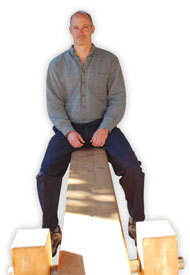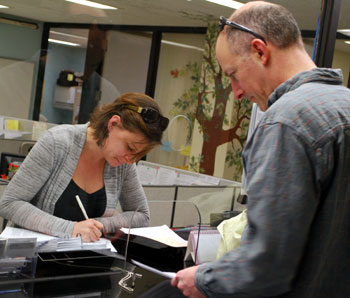Economy Teeters: We May(or) May Not Be Set
[Editor's Note: HD, a.k.a. Dave Askins, editor of The Ann Arbor Chronicle, is also publisher of an online series of interviews on a teeter totter. Introductions to new Teeter Talks appear on The Chronicle.]
The crash of the financial markets in the fall of 2008 was the best thing that ever happened to the Teeter Talk interview series. Why? Because the word on everyone’s lips two years ago was … “teeter,” which gave the awkward and vaguely dirty-sounding word some well-deserved airtime. On Oct. 12, 2008, the BBC reported the remarks of Dominique Strauss-Kahn this way [emphasis added]: “The world financial system is teetering on the ‘brink of systemic meltdown,’ the head of the International Monetary Fund (IMF) has warned in Washington.”
Closer to home, a week earlier, on Oct. 3, 2008, a dozen distinguished alumni from the University of Michigan Department of Economics had gathered for a panel discussion focused on the financial crisis. Linda Tesar, department chair and professor of economics, stated that “the financial markets are teetering.” [Chronicle coverage: "Economists Gather, Talk About Markets"]
That same financial crisis still persists, and it’s occupying a lot of Steve Bean’s attention. Bean is an independent candidate for mayor of Ann Arbor – the election takes place on Nov. 2. We talked recently on the totter, a few days after the League of Women Voters mayoral candidate forum. During our talk, he spoke about the need for the city to prepare for various worst case financial scenarios on the national financial scene – dramatic inflation or deflation. The coming decade could be worse than the last one, he believes, and that could be exacerbated by diminished worldwide capacity for oil production.
So if there’s a large theme to his campaign, it’s about the challenge of translating national issues to the local level in a way that best prepares our community for whatever unfolds in the next 10 years. Presumably, the way that Ann Arbor prepares for the next decade might look different from the way other communities prepare. Bean and I touched on that idea in the context of some recent environmental commission deliberations. Bean chairs that city commission.
At their Sept. 23, 2010 meeting, the commission discussed a recommendation to the city council to create a task force to educate the community about peak oil. [Peak oil is the idea that worldwide oil production capacity will soon peak, if it has not already peaked, and then begin to taper off.] The resolution got support from only three commissioners – Bean, Kirk Westphal, and Anya Dale – and did not pass. One of the suggestions during commission deliberations was that commissioners could simply read the reports that other communities had produced about what local strategies would be appropriate – instead of asking the city council to appoint an Ann Arbor task force.
Portland, Oregon, is one such community that has produced such a report. But Portland’s population of more than half a million residents – compared to Ann Arbor’s 114,000 or so – makes Portland a substantially different kind of community from Ann Arbor, doesn’t it? Well, buried in the appendix of a new book – “Our Patchwork Nation” written by Dante Chinni and James Gimpel – is a way of looking at Portland and Ann Arbor that makes the Ann Arbor-Portland comparison … still seem a little crazy, but perhaps a little less so. [Full Story]





